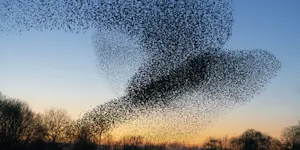What Makes This Word Tick
“Terpsichorean” is a delightful word that takes center stage when describing anything related to dance. Named after Terpsichore, the Greek muse of dance and chorus, this term embodies the grace and movement of the art form itself. It’s a word that almost sways when you say it, making you want to take a little twirl.
If Terpsichorean Were a Person…
Imagine Terpsichorean as an elegant, bohemian artist who floats into a room with a naturally rhythmic stride. Wearing flowing clothes and an infectious smile, this character exudes confidence and sophistication. They’re the life of the party, always encouraging others to join in the dance and feel the music pulse through their veins.
How This Word Has Changed Over Time
While “terpsichorean” stays loyal to its roots as a descriptor of dance, it has pirouetted into more casual contexts. Beyond classical references, it now pops up in modern dance reviews and even metaphorical uses, like describing the fluid grace of a smoothly executed plan or the rhythmic wit of a clever quip.
Old Sayings and Proverbs That Use Terpsichorean
While old sayings might not use “terpsichorean” directly, you can imagine one akin to “Every step is a dance on the journey of life,” embracing the spirit of the word.
Surprising Facts About Terpsichorean
In Greek mythology, Terpsichore wasn't just the muse of dance but also protected lyric poetry. This duality makes “terpsichorean” a word that can shuffle between inspiring movement and the rhythm of language itself. It’s also a favorite among those who enjoy dropping a rare gem into conversations.
Out and About With This Word
Hit the theater or a dance studio, and you might hear “terpsichorean” being tossed around with gusto. It’s often nestled in the quips and quirks of stage performers or used to describe the graceful footwork in a dazzling ballroom event.
Pop Culture Moments Where Terpsichorean Was Used
Remember Fred Astaire's films? While you may not hear “terpsichorean” in the dialogue, it perfectly sums up his mesmerizing dance routines. Such flair fits right in with any iconic dance scene, from Gene Kelly’s rain-soaked stroll to the vibrant moves in “Footloose.”
The Word in Literature
In literature, “terpsichorean” dances through narratives like an elusive, twirling fairy. It’s the kind of word you’d expect Virginia Woolf or F. Scott Fitzgerald to tuck into their novels when describing a lively party scene or an ethereal dance.
Moments in History with Terpsichorean
One can sense the essence of “terpsichorean” in the Roaring Twenties, an era defined by jazz and the Charleston dance craze. It would have been right at home among the flappers and speakeasies, capturing the exuberance of a time when everyone moved to the beat of lively, syncopated rhythms.
This Word Around the World
Across the globe, cultures have their own expressions linked to dance. While “terpsichorean” remains an English staple, in Spain, the flamenco embodies similar spirited grace. In India, the classical dance form Bharatanatyam might convey the same refined movement, even if the word doesn’t translate directly.
Where Does It Come From?
Diving deep into its etymological roots, “terpsichorean” draws from Terpsichore, one of the nine muses in Greek mythology. Her name combines the Greek words for “delight” and “dance,” perfectly capturing the joyful elegance of dancing arts.
How People Misuse This Word
Occasionally, “terpsichorean” is thrown into conversations as a misguided way to sound impressive, even when dance isn’t involved. It can be mistaken for a broader artistic reference when it’s firmly grounded in dance.
Words It’s Often Confused With
Choreographic: While related, this specifically refers to the design and composition of dance movements.
Theatrical: More general to the dramatic arts, it doesn't hold the same exclusive connection to dance.
Artistic: A broader term encompassing various forms of art, not solely dance-focused.
Additional Synonyms and Antonyms
Synonyms that share its lively spirit include “rhythmic” and “graceful.” On the quieter side, an antonym might be “stiff” or “awkward,” lacking the flowing movement the word implies.
Want to Try It Out in a Sentence?
“Her terpsichorean talents were unmatched, captivating audiences with every leap and twirl.”
















